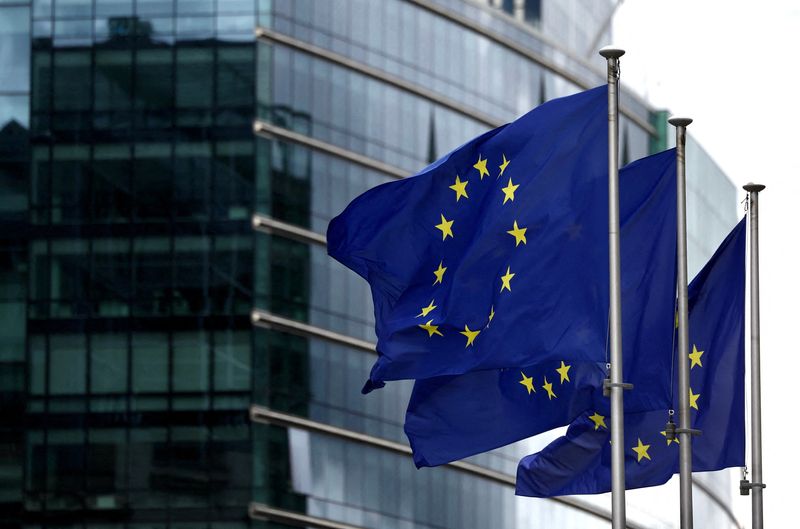EU proposes delay to EV trade rules with UK to avoid tariffs
2023.12.06 14:08

© Reuters. FILE PHOTO: European flags fly outside the European Commission headquarters in Brussels, Belgium September 20, 2023. REUTERS/Yves Herman/File Photo
By Philip Blenkinsop
BRUSSELS (Reuters) -The EU on Wednesday proposed a three-year delay to tightening rules that would have led to import tariffs being imposed from next year on many electric vehicles (EVs) traded with Britain.
Britain and the European Union are each other’s largest market for exports of EVs, which are being encouraged as an alternative to carbon-emitting internal combustion engine vehicles powered by gasoline or diesel.
The European Commission also said it was setting aside an extra 3 billion euros ($3.24 billion) to boost the bloc’s battery manufacturing industry, a move designed to increase local content and reduce its reliance on China.
The post-Brexit Trade and Cooperation Agreement (TCA) says that, to qualify for zero tariffs, at least 55% of the value of EVs needs to be from the European Union or Britain, with values of 65% for battery cells and modules and 70% for battery packs.
However, it contains two transition periods, the first with EVs requiring 40% local content and battery packs and components 30%, the second for 2024-2026 at 45% for EVs, 50% for battery cells and modules and 60% for battery packs.
Import tariffs of 10% apply for EVs falling short of those requirements.
The Commission’s proposal is to extend the first transition period for three years to 2027, when the full local content requirements of the TCA will apply.
There will be no second transition period. The European Automotive Manufacturers’ Association (ACEA) had estimated that its application in 2024 could have led to tariffs costing EU vehicle makers 4.3 billion euros. It welcomed the proposal.
European Commission Vice President Maros Sefcovic, who oversees EU relations with Britain, said that Russia’s invasion of Ukraine and soaring energy prices, along with support schemes of rivals, had slowed the scale-up of EU battery production.
Given batteries represent 30-40% of a car’s value and that most are from China, many carmakers argued they would have struggled to meet the content requirements of the second transition period. They said tariffs would principally have helped outside competitors, such as Chinese automakers whose exports to Europe are surging.
Swedish battery producer Northvolt said this “strong, strategic move” could help give Europe a competitive edge in the race towards more sustainable, circular batteries.
The proposal will be put to EU countries, most of which support it, before being presented to Britain, which also backs an extension.
($1 = 0.9267 euros)







